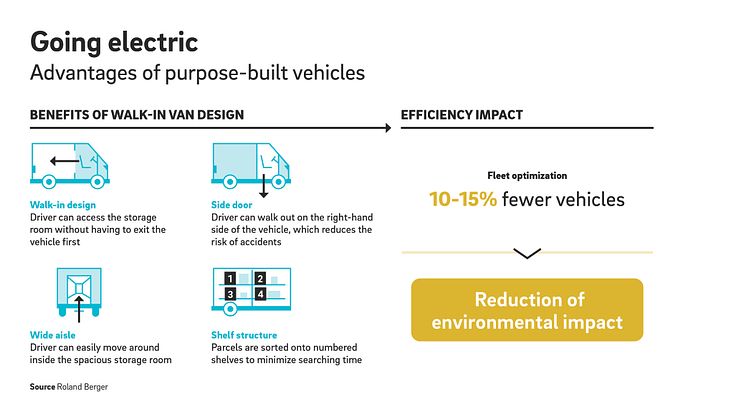
Press release -
Urbanization and climate issues call for rethinking in the logistics sector
- E-commerce is already putting a strain on urban logistics, and is expected to grow 9 percent annually over the next few years
- Purpose-built vehicles would allow delivery fleets to reduce by 10 to 15 percent and thereby lessen their environmental impact
- Stronger collaboration between logistics players can optimize flow of goods as well as reduce costs and handling time
Munich, October 2022: Urban logistics – the means by which goods are transported and delivered in urban areas to customers – is facing numerous challenges. The Covid-19 pandemic led to increased online shopping plus the demand for quickly delivered goods. To keep up, logistics services implemented an “atomized” approach, which has now resulted in even more challenges. Due to its limited space, urban environments require additional coordination to realize a more sustainable and efficient delivery system. In the study “From atomization to massification. Urban logistics must make a U-turn to achieve a sustainable future”, Roland Berger experts advise moving away from the current fragmented process of delivery and urge different stakeholders to work closely together to bundle flows and transform the entire ecosystem.
“The challenges for urban logistics are many,” says Tobias Schönberg, Partner at Roland Berger. “Customer expectations regarding speed and flexibility are growing fast, cities are becoming ever more congested, emissions are increasing, and regulation is tightening. However, the accompanying infrastructure is, by and large, failing to keep up with demand. The volatility of seasonal demand also complicates the future planning of logistics providers to determine what resources are needed. It is in the best interest of the public to manage the given challenges in a smart way to maintain convenience for the customers, while also reducing traffic and emissions – especially in urban centers. Urgent solutions are needed. Urban logistics must transform from atomization to massification to become sustainable and more efficient.”
Demanding market environment led to “atomization” of urban logistics
Among the many lasting changes in consumer shopping behaviors that the Covid-19 pandemic has led to, is an increasing demand for convenience. Around 56 percent of online shoppers aged 18 to 34 years now expect same-day delivery. E-commerce currently represents around 20 percent of global retail sales and it is showing no signs of slowing down. Driven by the surge in online shopping and the demand for faster delivery times, e-commerce is expected to grow 9 percent annually over the next few years.
These challenges are not limited to B2C markets. Increasing demand for B2B e-commerce could result in even greater atomization in urban logistics. The global merchandise value from B2B e-commerce is forecasted to grow by around 17 percent every year through 2025. While unit volumes are typically larger in B2B than in B2C markets, B2B e-commerce growth will bring further volatility of delivery demand compared to traditional offline sales. It remains to be seen whether B2B e-commerce will become as atomized as that of B2C, but with business customers expecting the same speed and convenience as they receive in their private dealings, its impact on the complexity of logistics is already evident.
Optimization through purpose-built vehicles and stronger cooperation between logistics operators
Several measures exist to alleviate the stress placed on urban logistics chains. Some logistics players, for example, have already adopted purpose-built vehicles (PBVs). PBVs provide an optimized design for delivery workers, such as a direct walk-in from the driver's cabin to the storage space for easy access to the transported goods without having to exit the vehicle. A wide, bright aisle and clear shelf structure also make the handling of packages more ergonomic. A side door on the right-hand side of the vehicle increases the drivers’ safety by allowing them to exit the PBV directly onto the sidewalk. Optimizing an entire fleet of delivery vehicles in this manner could reduce a fleet’s size by 10-15 percent, which would also reduce its environmental impact.
Collaboration among logistics operators would likewise further reduce atomization. This would require the stakeholders involved to share information as well as transportation and infrastructure assets. This would make bundled deliveries possible, leading to reduced costs and delivery times for both businesses and consumers, as well as lower carbon emissions and urban congestion.
Gabriel Schillaci, Partner at Roland Berger, expands on this: “Looking ahead, the massification of urban logistics appears, to some extent, inevitable, even if it’s only the result of consolidation among logistics players. But operators should consider a stronger collaboration, such as sharing facilities and pooling flows. This would allow them to increase the efficiency of the transport of goods to urban areas by optimizing the loads of last-mile vehicles and shipping a larger volume of goods at constant capacity. Additionally, shipping routes can also be optimized by limiting the number of vehicles delivering to different customers in the same area. Different operators could share and bundle delivery routes and geographic areas. Further improvements could also be made by sharing data to predict customer demands more accurately.”
Topics
Categories
Roland Berger is the only strategy consultancy of European origin with a strong international presence. As an independent firm owned exclusively by our partners, we have 51 offices with a presence in all major markets. Our 2,700 employees are characterized by a unique combination of analytical thinking and an empathetic mindset. Driven by our values of entrepreneurial spirit, excellence, and empathy, we are convinced that business and society need a new, sustainable paradigm that focuses on the whole value-creation cycle. By working in interdisciplinary teams across all relevant sectors and business functions, Roland Berger offers the best expertise worldwide for successfully overcoming the profound challenges of our age now and in the future.




